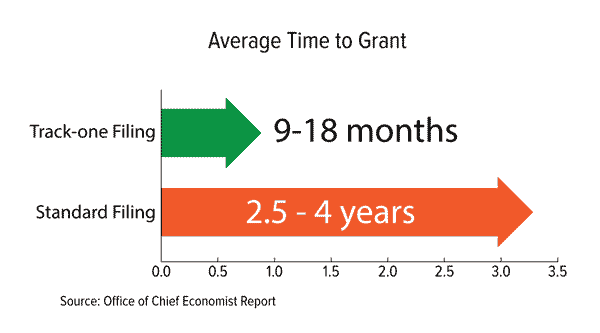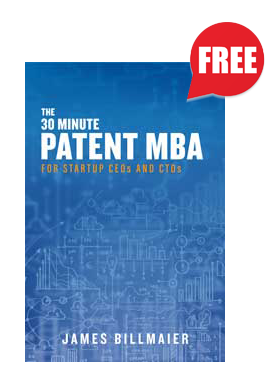This is #6 in our series of chapter excerpts from the book The 30 Minute Patent MBA by TurboPatent CEO Jim Billmaier. Want to get the full ebook for free? Grab it here.
How Long Does It Take to Get a Patent?
(and How Much Does It Cost?)
One of the biggest questions people have about the patent process is about how long it takes, most often in reference to both the application process and the amount of time the inventor must spend away from daily tasks.

The standard patent process itself takes an average of more than three years. However, an increasing number of companies are beginning to use what is known as the Track One accelerated process. This faster process guarantees a response from the USPTO within one year and final resolution within eighteen months.
Track One costs small corporations an additional $2,000 upfront per patent application. While the upfront cost is higher, we’ve found (as have others who have analyzed the process) that the total cost can be the same or even less than for non-accelerated applications. Additionally, the grant rate is consistently and significantly higher for Track One applications.
The inventor-time typically required as part of the patent process can vary widely depending on the invention. When the invention disclosure is created as part of the engineering process, it maximizes the efficiency of the creation of IP and creates higher quality results.
How much does a patent cost?
If you ask most law firms how much you can expect to pay for a patent, the answer you’ll likely get is “it depends.” It’s a fair answer, but not a particularly useful one. The fact is that law firms typically charge anywhere between $3,000 to $15,000 to file a provisional patent application or non-provisional patent application, depending on how complex the invention is and how much the firm charges per hour.
| Type of Application | Examples | Traditional Cost | AIP Cost |
|---|---|---|---|
| Provisional | all | $3,000-$5,000 | $1,500-$2,000 |
| Simple | paper clip, board game | $5,000-$10,000 | $3,000-$5,000 |
| Moderately Complex | power tool, cell phone | $8,000-$12,000 | $4,000-$6,000 |
| Highly Complex / Software | MRI scanner, automated system | $12,000-$15,000 | $6,000-$8,000 |
Based on small entity filing
Patent firm alternatives (such as the one offered by my company, TurboPatent) have a staff of trained patent engineers who utilize AI and machine learning (Automated Invention Protection, or AIP) to create high quality patents in less time and therefore at a lower cost. In many cases, an AIP-powered patent filing costs 50 to 60% less than a manual one.
Sources: IP Watchdog, Blue Iron
This has been an excerpt from the book The 30 Minute Patent MBA by Jim Billmaier. Used by permission of the author. Want to get the full ebook for free? Grab it here.





